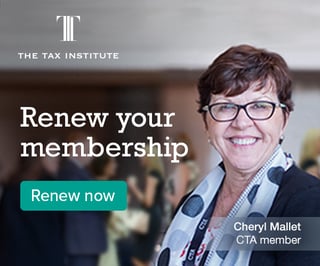Rachel Vijayaraj, CTA, weighs in on the
Chartered
Tax Adviser (CTA) Program and how it’s supported her career.
Tax Adviser (CTA) Program and how it’s supported her career.
We caught up with Rachel Vijayaraj, CTA at the 34th
National Convention in Hobart. She is a Senior Associate at Brown Wright Stein
Lawyers. She was also awarded Duce in CTA3
Advisory, the final subject in the CTA Program before obtaining
the CTA designation.
National Convention in Hobart. She is a Senior Associate at Brown Wright Stein
Lawyers. She was also awarded Duce in CTA3
Advisory, the final subject in the CTA Program before obtaining
the CTA designation.
“I've been practising as a lawyer for the last 10 years,”
she says.
she says.
“In the early part of my career, I practised in tax disputes
(and that still forms a part of my practice) although my interests have led me
to specialise in trusts, estates, and not-for-profits with a focus on tax.”
(and that still forms a part of my practice) although my interests have led me
to specialise in trusts, estates, and not-for-profits with a focus on tax.”
Rachel says the most valuable aspect of the
CTA
Program was the collaborative approach in learning with peers, and
particularly in consolidating her tax knowledge in areas that she might not
practice regularly.
Program was the collaborative approach in learning with peers, and
particularly in consolidating her tax knowledge in areas that she might not
practice regularly.
“One of the key areas of new confidence for me was studying
the elective corporate tax,” she says.
the elective corporate tax,” she says.
“I've practised in the SME and private client space, and I
don't have much exposure in respect of large corporates. Studying the corporate
tax elective helped me to get a better understanding of how the tax law applies
to large corporates.”
don't have much exposure in respect of large corporates. Studying the corporate
tax elective helped me to get a better understanding of how the tax law applies
to large corporates.”
Education: Give your clients the best tax advice by becoming a Chartered Tax Adviser. Enrol into
CTA3 Advisory.
Why CTA3 Advisory?
“I was attracted to the calibre of educators, and I was
pleasantly surprised by the collegiate environment of studying with peers, both
lawyers and accountants,” she says.
pleasantly surprised by the collegiate environment of studying with peers, both
lawyers and accountants,” she says.
“And it's also very rewarding to be able to receive the
CTA
designation, which is globally recognised.
designation, which is globally recognised.
“To be the Dux of the
CTA
Program is really quite exhilarating.
Program is really quite exhilarating.
“Just shows that hard work pays off,” she adds.
How to juggle life
and study
and study
“I did one elective whilst I was on maternity leave, so I
was actually juggling being a mum and studying, which I found marginally easier
than juggling work and study,” she said.
was actually juggling being a mum and studying, which I found marginally easier
than juggling work and study,” she said.
“But I definitely think the key challenge is actually
working out what is realistic as a goal for you.
working out what is realistic as a goal for you.
“My advice for practitioners that are juggling work and
study is to be realistic about the goals that you can achieve.
study is to be realistic about the goals that you can achieve.
“I find that largely a lot of professionals are
perfectionists, and it's just working out really what is achievable and what's
acceptable.
perfectionists, and it's just working out really what is achievable and what's
acceptable.
“And it doesn't have to be absolutely perfect. We cannot be
perfect in every aspect of our lives,” she adds.
perfect in every aspect of our lives,” she adds.
Where to next for
Rachel?
Rachel?
“For me, in continuing tax education, I find regular monthly
tax updates helpful in keeping up with the key changes in the law,” she says.
tax updates helpful in keeping up with the key changes in the law,” she says.
“I also find attending tax forums like the National
Convention particularly helpful in hearing from experts in their field about
current topics.
Convention particularly helpful in hearing from experts in their field about
current topics.
Rachel says The Tax Institute membership has supported her
career by “giving me an avenue to study, as well as network with peers and with
experts in their field.”
career by “giving me an avenue to study, as well as network with peers and with
experts in their field.”
She adds, “I've found it particularly valuable to be mentored
by others, or to even just to benefit from different views that might not
necessarily be the same as my own.”
by others, or to even just to benefit from different views that might not
necessarily be the same as my own.”









